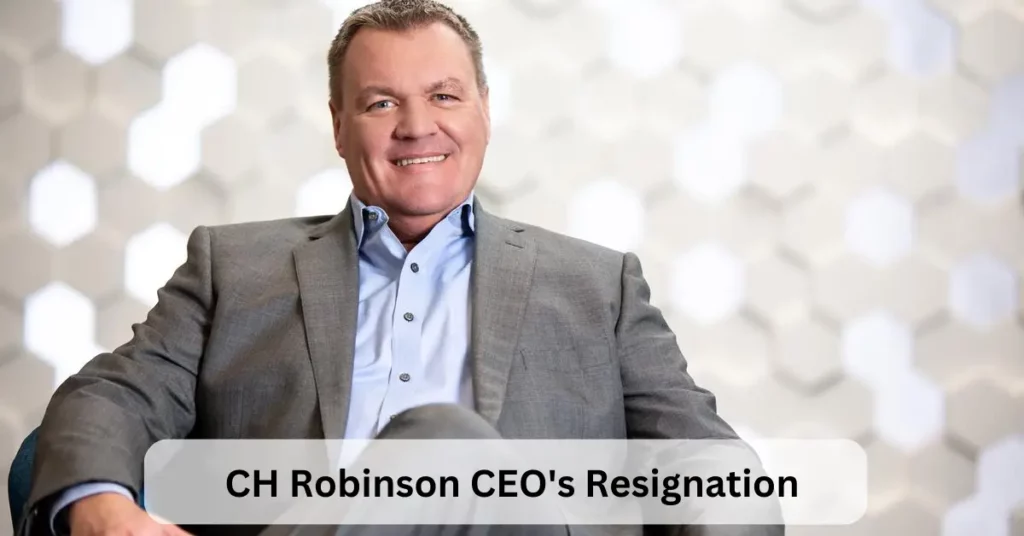CH Robinson CEO’s Resignation: In a federal filing, C.H. Robinson described Bob Biesterfeld’s resignation as an “involuntary termination by the company without cause” on Saturday.
The company announced on Tuesday that Scott Anderson, the board chair, is now serving as interim CEO.
When it made its public announcement on Tuesday morning, the Eden Prairie-based company did not provide a justification for the abrupt transition. The largest national executive search firm, Russell Reynolds, has hired the logistics and freight giant to find a long-term replacement.
According to Jack Atkins, an analyst with Stephens Inc., the company’s top executive has been under increasing pressure for some time.
Atkins noted in a note to investors on Tuesday that “our sense is that this transition has been building in recent months.”
The company’s decline has been rocky as the pandemic’s supply chain disruption becomes the new norm. After the weak third-quarter performance, C.H. Robinson said in November that it will fire 650 employees or 3.6% of its workforce.
In July, Biesterfeld predicted that the company would see decreased demand due to rising inflation rates and shifting consumer behavior. According to him, demand will decline in the second half of the year due to weakening retail and housing sectors.
“It has been a privilege to lead C.H. Robinson and this exceptional team,” Biesterfeld said in a news release. “I am proud of all that we have achieved together, and it has been a pleasure working with so many talented members of the team throughout the organization during my tenure as CEO. I am confident that C.H. Robinson’s industry-leading people and culture will continue to ensure that the company is well-positioned for the future.”
Jodee Kozlak was appointed independent chair of the board and Anderson was chosen as temporary CEO. Biesterfeld received praise from Anderson for his “important contributions” during his three years as CEO.
Biesterfeld, a native of Minnesota and a graduate of Winona State, has been with C.H. Robinson since 1999 and held executive positions in the company’s two largest divisions, North American Surface Transportation and Robinson Fresh, until being named CEO in May 2019.
As CEO, one of Biesterfeld’s major goals was to quadruple the pace of the business’s technology expenditures in order to strengthen its competitive advantages over other third-party logistics companies. He declared that C.H. Robinson would spend $1 billion on technology over the following five years in 2019.
But recently, an activist investor has put pressure on the corporation. In February, Ancora Holdings Group won two seats on the C.H. Robinson board of directors. Subsequently, the company negotiated a standstill agreement that will end on January 5.
For those board positions, Ancora proposed Henry Maier, the former CEO of FedEx Ground, and Henry “Jay” Winship, the founder, president, and managing member of Pacific Point Capital.
Midway through December, C.H. Robinson added Jim Barber, a former chief operating officer of United Parcel Service, to the board. Barber has worked in the transportation sector for 35 years.
The lackluster third-quarter results, which were announced in November, “and what was appearing to be a very challenging earnings backdrop for the company,” according to Atkins, the Stephens Inc. analyst, probably influenced the CEO choice.
Anderson has served as chair of the C.H. Robinson board since 2020 after being named to the board in January 2012. From 2010 to 2017, he served as Patterson CosCEO. .’s
Anderson said in the news release he was “committed to ensuring this will be a seamless transition.”
The moment is appropriate for C.H. Robinson to advance our strategic ambitions, and the board is concentrating on finding a CEO replacement who can seize Robinson’s future potential, he stated. I’m excited to collaborate closely with our great staff to further enhance the carrier and customer experience and scale our digital operations to promote long-term success.
Anderson won’t be a candidate for the position of permanent CEO, according to the SEC filing from Tuesday. But the search firm doesn’t need to look very far if it wants to move quickly on finding the new CEO. Both board members Maier, 68, and Barber, 62, have worked in the transportation sector for at least 35 years.
The largest third-party logistics company, C.H. Robinson, generates about $23 billion in revenue annually. The market is dispersed. Along with numerous tiny rivals, there are an increasing number of startups funded by technology.
Because of the extensive network of shippers and carriers it collaborates with, Morningstar analyst Matthew Young estimates that C.H. Robinson controls 17% of the truck brokerage market in the United States, but he also points out that competition is growing.
“We expect the competition to slowly become more organized as the industry consolidates,” Young wrote in a research note.
Atkins is unsure about the short-term prospects for C.H. Robinson given the difficulties the company is facing.
“We think the issues here are bigger than one person and will take a while to fix,” Atkins wrote. “Additionally, the CEO transition could raise cultural issues as we believe Mr. Biesterfeld was highly respected internally.”
Tuesday’s closing price for C.H. Robinson shares was $90.28, down 1.4%. The stock’s price during the preceding 52 weeks has varied from $86.57 to $121.23 per share.
